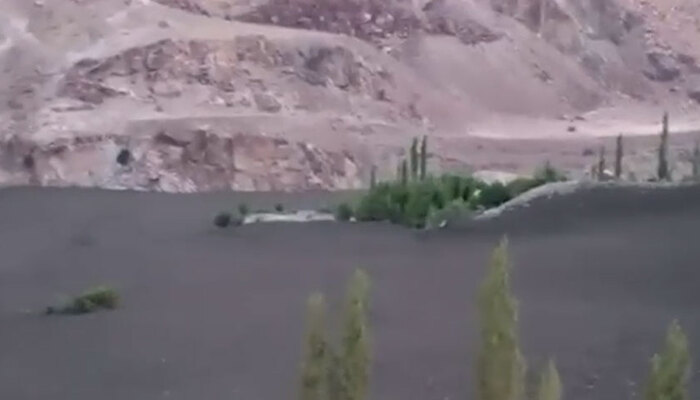
A sudden glacier burst in Gupis, Gilgit-Baltistan, triggered severe flooding that stranded local communities and blocked vital routes. In response, the Pakistan Army launched an immediate rescue mission, deploying troops, helicopters, and support teams to evacuate affected families and provide urgent relief.
Glacier burst triggers crisis
The disaster struck Roshan village in the Tilli Das area of Gupis Tehsil. A glacial lake outburst flooded the valley, disrupting the natural flow of the river. The sudden surge of water and debris created dangerous conditions for residents living along the riverbanks.
Officials reported that soil erosion has made the situation even worse. Large sections of land near the water have collapsed, damaging fields, homes, and infrastructure. With road access cut off, reaching the isolated communities became extremely difficult.
Pakistan Army takes swift action
The Pakistan Army immediately mobilized its rescue forces to deal with the emergency. Troops began clearing access routes and providing first aid to those affected. Helicopters were put on standby to airlift stranded families from hard-to-reach locations.
The Gilgit-Baltistan Scouts’ Quick Reaction Force (QRF) reached the site first. Their priority was to relocate residents to safer areas before the floodwaters could cause further damage. Working in coordination with the army, they began shifting families to designated relief points.
Civil administration joins rescue efforts
The civil administration also moved quickly. Rescue 1122 teams were dispatched with medical supplies, boats, and rescue equipment. Their role was to support the army’s operation and provide emergency relief on the ground.
Local officials stressed that all available resources were being used. They said the focus remained on saving lives, restoring communication, and providing food and shelter to displaced families. Relief camps have been set up near safe zones to accommodate evacuees.
Frontier Corps prepares for air evacuation
The Frontier Corps Northern Areas (FCNA) also prepared for a large-scale operation. With many villages cut off by floods and landslides, air evacuation became essential. Helicopters were readied to reach families stuck in mountain areas where roads no longer exist.
According to military officials, these flights will not only rescue stranded people but also deliver food, water, and medicine. The army stated that every effort is being made to ensure no community remains cut off.
Read: China-Pakistan Strategic Dialogue: Wang Yi Meets COAS Asim Munir in Islamabad
Difficult terrain hampers rescue
Despite the quick response, rescue teams faced major challenges. The rugged mountain terrain, combined with swollen rivers, limited ground movement. Landslides triggered by heavy water flow blocked roads in multiple areas.
Residents reported that several bridges were washed away, further isolating villages. With the water still rising, fears of additional floods remain. The army warned that further erosion could worsen the disaster if urgent steps are not taken.
Local communities struggle
Villagers described scenes of panic as floodwaters swept through their homes and farmland. Many families lost livestock and food supplies. With their houses damaged and roads destroyed, they waited anxiously for helicopters and rescue boats.
Local elders appealed for continued relief, emphasizing that the region’s harsh weather could make survival difficult without immediate aid. They also called on authorities to strengthen flood defenses in the future to protect communities from similar disasters.
Authorities stress preparedness
Officials highlighted that glacial bursts are becoming more frequent in Gilgit-Baltistan due to climate change. Rising temperatures are melting glaciers faster, creating unstable lakes that can collapse without warning.
Experts noted that this latest incident should serve as a reminder to invest in early warning systems, disaster preparedness, and stronger infrastructure. They emphasized that proactive steps could save lives and reduce economic losses in future emergencies.
National response and next steps
The federal and provincial governments have been briefed on the situation. Relief funds are being mobilized, and humanitarian organizations are preparing to assist with longer-term recovery. Medical camps and food distribution networks are being set up for displaced families.
The Pakistan Army assured the public that rescue efforts will continue until all affected people are safe. Military engineers are also surveying the damage to assess how soon road links can be restored.
As helicopters began lifting stranded residents to safety, officials expressed cautious optimism. With combined efforts from the army, civil administration, and local communities, they believe the crisis can be brought under control.
A test of resilience
The glacier burst in Gupis stands as a stark reminder of the risks mountain communities face in Gilgit-Baltistan. It has tested both the resilience of local people and the response capacity of authorities.
For now, the focus remains on saving lives and restoring stability. Yet the disaster has also sparked renewed calls for long-term solutions to deal with the growing threat of glacial lake outbursts in Pakistan’s northern regions.
Follow us on Instagram, YouTube, Facebook,, X and TikTok for latest updates
